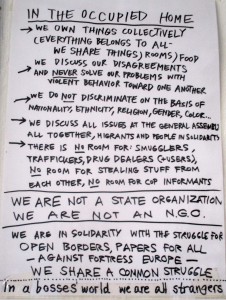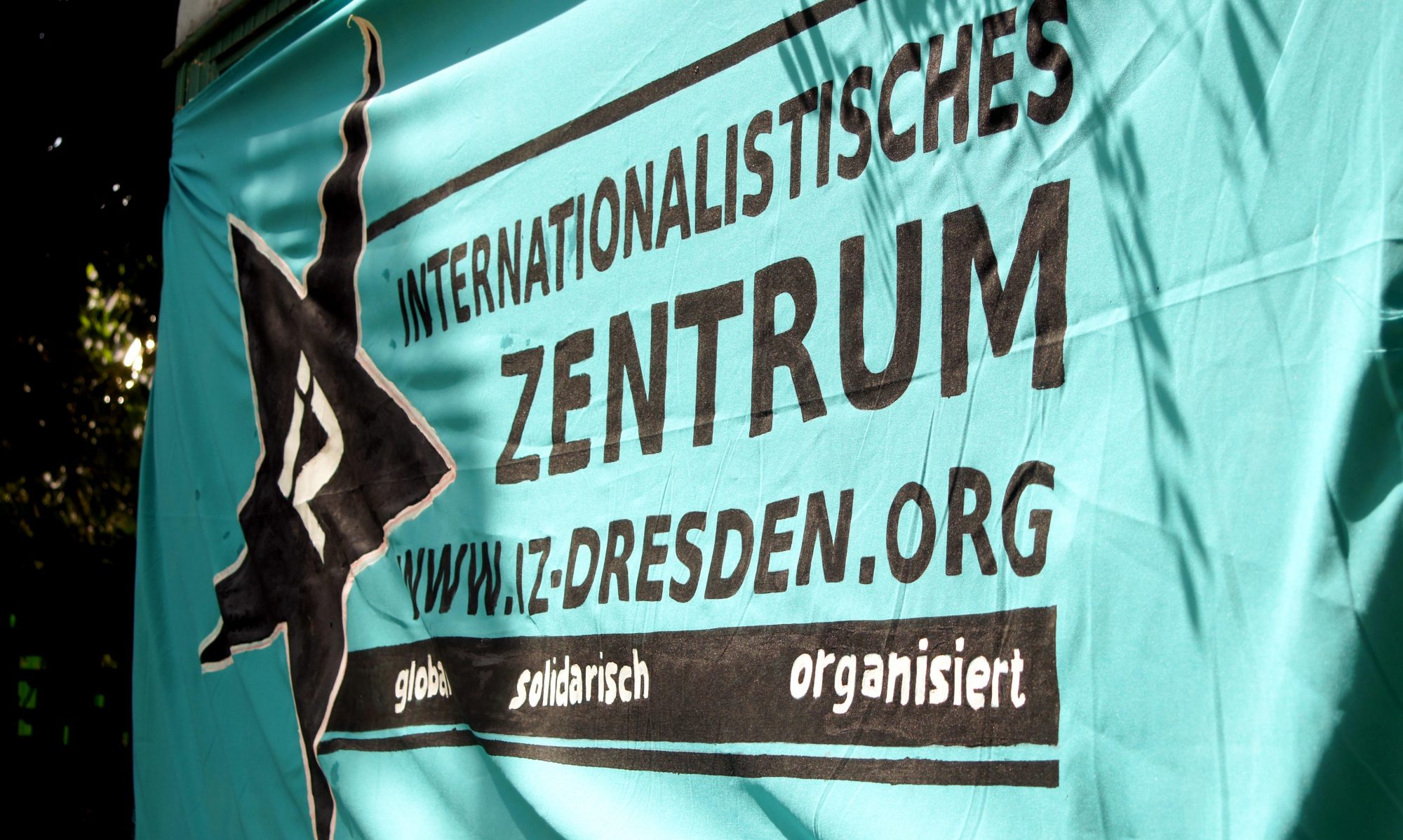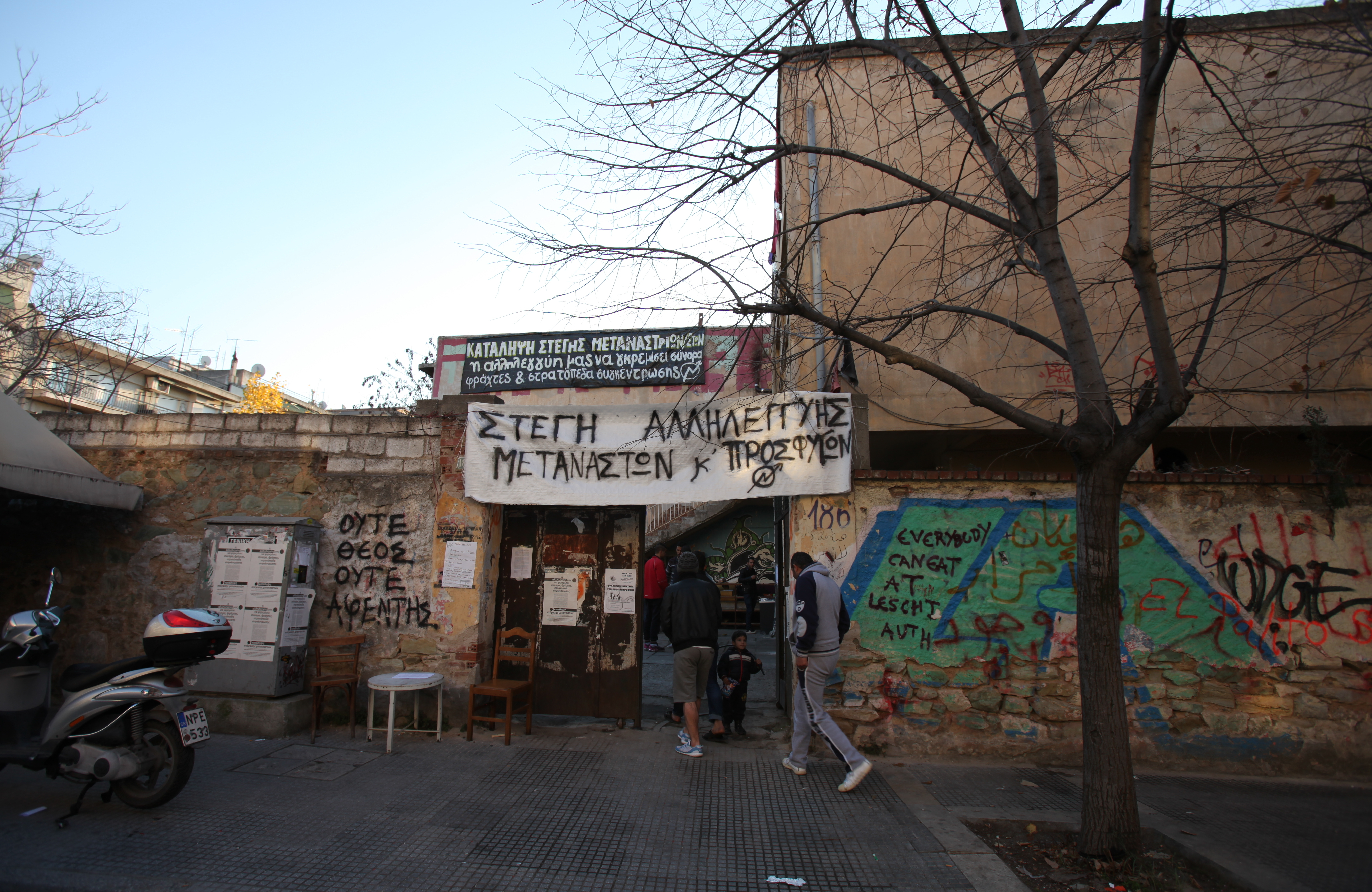On the 5th of January we took part in a discussion meeting at the Orfanotrofio. There, different projects and initiatives for and with refugees introduced themselves. Persons from Lesbos, Athens and of course from Thessaloniki were part of podium, who gave a short input about the local situation and the current status of the structures of solidarity. We skip the information about the Notara in Athens and about Lesbos at this point, because we are going to report on this soon. Instead we want to focus on solidary and self-criticism of the Orfanotrofio (see also article 3). Not just during the podium discussion, but also in individual talks, additionally to general solidarity, the Orfanotrofio was criticized repeatedly. We didn’t hear an absolute rejection of the attempt to get organized with refugees and to support them.
It’s important to document the criticism here to not produce the impression that “in Greece everything is better” and eventually to make key points available for some discussions in Germany as well. Our positive experiences streched from the critical faculties and the willingness to partake in discussions to the solidary behaviour in general. We structured this report roughly in the two main parts: “self-criticism” and “criticism”. In fact there is no internal and external perspective, because almost everyone we talked to was somehow involved in the activities of the Orfanotrofio. So there is no precise cut to be made between the two. Therefore we seperated the information we got in those from the official discussion and those we got in conversations with individuals. Our records are just fragments and do not claim to show an all-encompassing sight.
Self-criticism
1) Inclusion of the refugees is not ideal yet
 There is often a lack of translation into common languages like Arabic, Farsi or Urdu. As a result of this, one of the biggest problems is the language barrier. To organize joint meetings, there has to be a translation and an according conduct of speaking with breaks for the translation. It is still difficult to find translators, but the situation improved. By now it’s possible to realize joint meetings. One input to the discussion was about the ‘integration of refugees into the anarchist/anti-authoritarian structures as one of the most important tasks, which is approached right now’. The mediation of different rules and principles takes some time, comprehension and tact. Similar to Notera (a squat in Athens) the welcome group, that we named in our 3rd report shall expand. It shall be staffed by Greek activists and refugees and shall be able to inform newly arrived refugees about internal rules and values, so that the conflict potential can be minimized from the start.
There is often a lack of translation into common languages like Arabic, Farsi or Urdu. As a result of this, one of the biggest problems is the language barrier. To organize joint meetings, there has to be a translation and an according conduct of speaking with breaks for the translation. It is still difficult to find translators, but the situation improved. By now it’s possible to realize joint meetings. One input to the discussion was about the ‘integration of refugees into the anarchist/anti-authoritarian structures as one of the most important tasks, which is approached right now’. The mediation of different rules and principles takes some time, comprehension and tact. Similar to Notera (a squat in Athens) the welcome group, that we named in our 3rd report shall expand. It shall be staffed by Greek activists and refugees and shall be able to inform newly arrived refugees about internal rules and values, so that the conflict potential can be minimized from the start.
2) Shifts and missing responsibility
Circa 200 people took part at the first assembly and promised support for the squat. Lots of them are active in different political groups and as time goes by they have to devote themselves to their other tasks again. Many people were at home with their families over the holidays and not in Thessaloniki, which complicated the scheduling of the shifts. These days the situation improved again, but future responsibilities are still an open question.
3) The missing framework for the occupied building
Because the occupation of the house was relative spontaneous, this problem was also mentioned. The people in the Orfanotrofio and their supporters had to realize that every practical decision has a political consequence.
A practical example: Who can find accommodation in the squat? For example at the Notera, in Athens, only families, women with kids and underage persons are supposed to stay there, because these groups need most protection. This decision seems understandable, because the situation in Athens seems completly different, but equally it is extremly excluding. Thus decision against the admission of certain groups can cause discrimination and eclusion even more and therefore has wide political consequences. At the Orfanotrofio exclusion is directed towards drug dealers, drug users, police informers and smugglers (meaning human traffickers) only, however not towards single male refugees. Smugglers get excluded, because ‘individual solutions for collective problems can not be supported’. If a person wants to work together with a smuggler it’s not sustained by the group. Not any support will be given in that case. There are no other reasons for exclusion yet.
4) Self-perception and expectations of the refugees
This also was self-critically made up discussion by a person in the discussion: You can’t expect that refugees are automatically radical and politicized individuals. To project the own claim directly is definitely the wrong way. It is more important to build up the first social relations and listen to each other to find joint solutions for individual problems.
Criticism
1) The limits of self-organization
This criticism we understood more as a reference instead of profound criticism on the Orfanotrofio. Some comrades were already involved in refuggee struggles some years ago. A major problem there were a clan system, tribal organizations, the organization in gang-structures, patriarchal systems and other hierarchies. If people had to live on the streets for years they often created or joined structures that aren’t necessarily egalitarian or progressive. Organizational structures of flight and illegalization arise, that can be contradictory to the collective ideals. One comrade commented, that the ‘limits of self-organization’ are reached ‘if you have to talk to the bosses’. He couldn’t offer a solution for this problem.
2) Identitary self-perception
You cannot achieve a lot with striking and demarcating proclamations like they made by many anarchists before the occupation. Policies of identity would be misplaced, including statements like: “We don’t want cops, municipal administration, no church and so on.” Thats not necessarily wrong but a differentiated communication can also be needed. For example concering the church: “Don’t make demands for this area, keep out, but bring food along.” or put pressure on the city administration so they provide appropriate houses and rooms.
3) Pressure points
The unsolved question remains, how to put pressure on certain institutions. Does it make more sense to give financial support at legal representation and send more lawyers or to put more pressure onto the government? Are demonstrations or rather occupations appropriate ways or is both needed? Up to now its further discussed how to put which pressure onto whom to achieve the biggest success – there is no common strategie till now.
4) Extent of the occupation and emotional level of action instead of strategic considerations
The Greek movement seems to be unable to sustain more squated places. The contacts to Italy show that there e.g. is a mass movement which is responsible for the occupation of flats and houses with, by and for homeless people and refugees. That seems to be necessary here, too. A comparable movement doesn’t exists in Greece and the ‘scene’ has not enough capacities. The urge to act, because of different feelings / emotional desires is not the right way and no real strategy to face the current problems. The Orfanotrofio has originated from such an emotional urge. Now they have to put a lot of their power into infrastructural tasks. Thereby the political pressure and political development wouldbe strongly effected.
We want to underline again that besides all the criticism, it was always mentioned that a concrete place to come together with refugees and to organize themself is necessary and important. Merely the question of the ‘how?’ and ‘when?’ released discussions. Up to now it’s not clear in which way the Orfanotrofio will develope. Based on our interviews we can imagine three main-tendencies: 1) A space administered by Greek people that offers accommodation for refugees on their flight – the most unlikely tendency, 2) A jointly organized place for living and cultural space 3) A space for joint political struggles. In between there may be certainly many “hybrid forms”. How useful a division from that point of view is, remains to be seen.
In the Korinthos detention camp, a revolt of detained refugees broke out on the 5th of January. During the next days, 30 people from Morocco, shall be deported. There are rumors that another 60 moroccans will be transfered to other deportation prisons in Athens. We will be in Athens tomorrow and visit the Korinthos detention camp with a lawyer to talk to a detained refugee.

